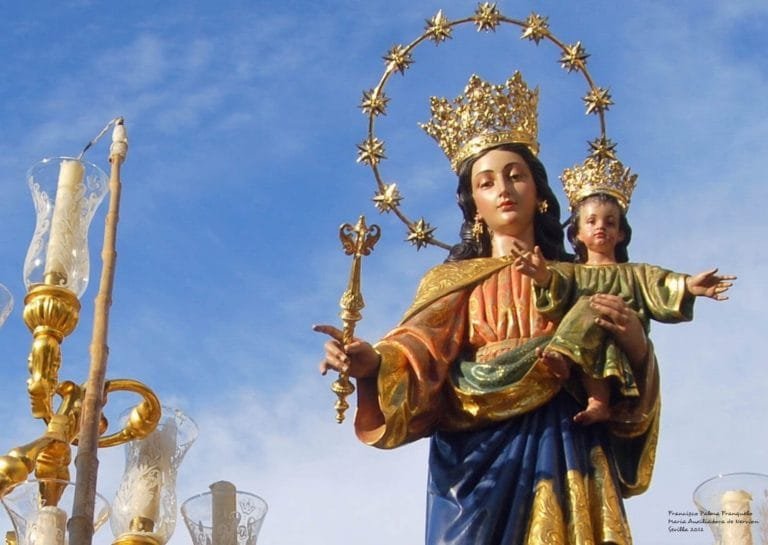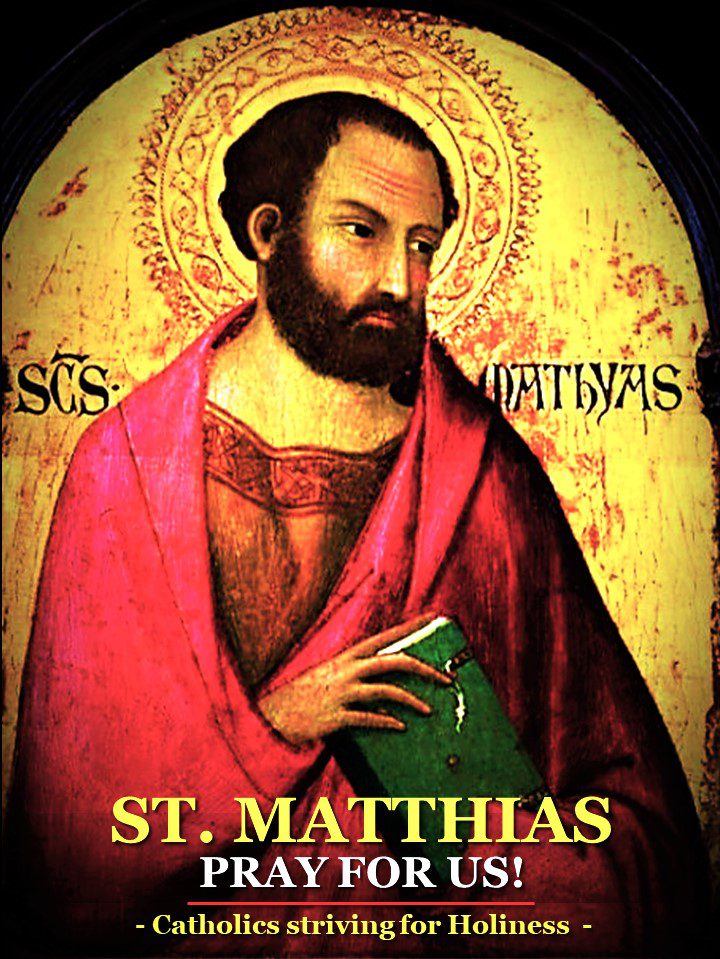MAY 3: POPE BENEDICT XVI ON STS. PHILIP AND JAMES.
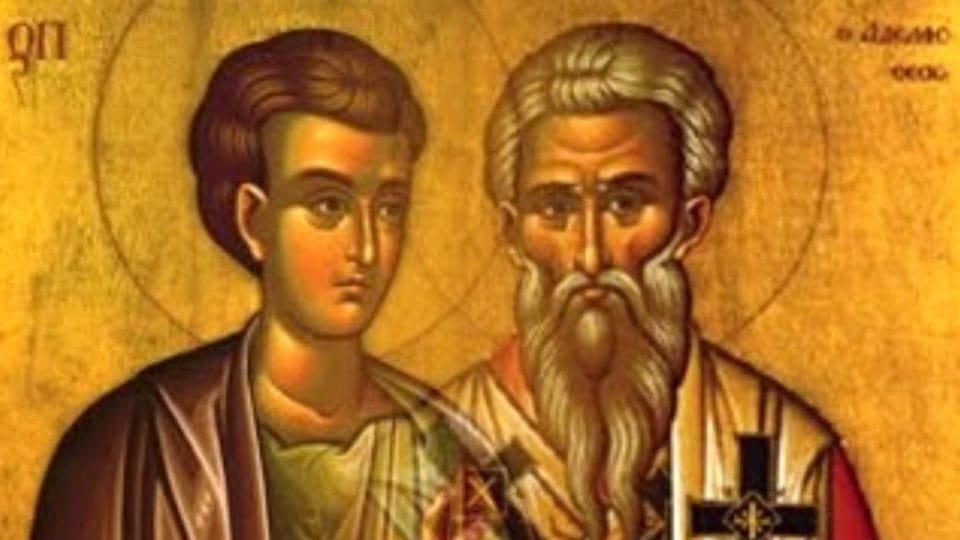
Pope Benedict XVI on Saint Philip, Apostle
Dear Brothers and Sisters,
While we continue to outline the features of the various Apostles, as we have been doing for several weeks, today we meet Philip. He always comes fifth in the lists of the Twelve (cf. Mt 10:3; Mk 3:18; Lk 6:14; Acts 1:13); hence, he is definitely among the first. Although Philip was of Jewish origin, his name is Greek, like that of Andrew, and this is a small sign of cultural openness that must not be underestimated. The information we have on him is provided by John’s Gospel. Like Peter and Andrew, he is a native of Bethsaida (cf. Jn 1:44), a town that belonged to the Tetrarchy of a son of Herod the Great, who was also called Philip (cf. Lk 3:1).
The Fourth Gospel recounts that after being called by Jesus, Philip meets Nathanael and tells him: “We have found him of whom Moses in the law and also the prophets wrote, Jesus of Nazareth, the son of Joseph” (Jn 1:45). Philip does not give way to Nathanael’s somewhat sceptical answer (“Can anything good come out of Nazareth?”) and firmly retorts: “Come and see!” (Jn 1:46). In his dry but clear response, Philip displays the characteristics of a true witness: he is not satisfied with presenting the proclamation theoretically, but directly challenges the person addressing him by suggesting he have a personal experience of what he has been told. The same two verbs are used by Jesus when two disciples of John the Baptist approach him to ask him where he is staying. Jesus answers: “Come and see” (cf. Jn 1:38-39).
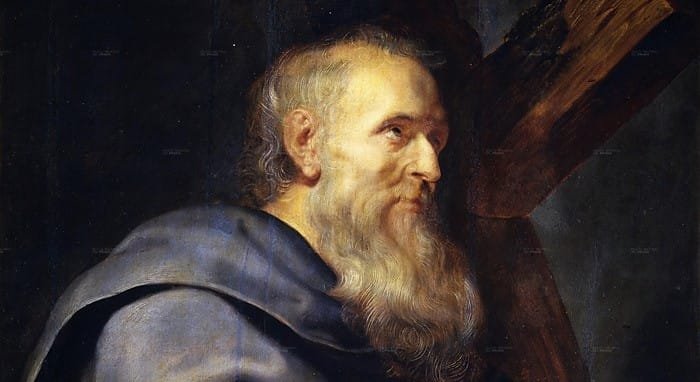
We can imagine that Philip is also addressing us with those two verbs that imply personal involvement. He is also saying to us what he said to Nathanael: “Come and see.” The Apostle engages us to become closely acquainted with Jesus. In fact, friendship, true knowledge of the other person, needs closeness and indeed, to a certain extent, lives on it. Moreover, it should not be forgotten that according to what Mark writes, Jesus chose the Twelve primarily “to be with him” (Mk 3:14); that is, to share in his life and learn directly from him not only the style of his behavior, but above all who he really was. Indeed, only in this way, taking part in his life, could they get to know him and, subsequently, proclaim him. Later, in Paul’s Letter to the Ephesians, one would read that what is important is to “learn Christ” (4:20): therefore, not only and not so much to listen to his teachings and words as rather to know him in person, that is, his humanity and his divinity, his mystery and his beauty. In fact, he is not only a Teacher but a Friend, indeed, a Brother. How will we be able to get to know him properly by being distant? Closeness, familiarity, and habit make us discover the true identity of Jesus Christ. The Apostle Philip reminds us precisely of this. And thus he invites us to “come” and “see”, that is, to enter into contact by listening, responding, and communion of life with Jesus, day by day.
Then, on the occasion of the multiplication of the loaves, he received a request from Jesus as precise as it was surprising: that is, where could they buy bread to satisfy the hunger of all the people who were following him (cf. Jn 6:5). Then Philip very realistically answered: “Two hundred denarii would not buy enough bread for each of them to get a little” (Jn 6:7). Here one can see the practicality and realism of the Apostle, who can judge the effective implications of a situation. We then know how things went. We know that Jesus took the loaves and, after giving thanks, distributed them. Thus, he brought about the multiplication of the loaves. It is interesting, however, that it was to Philip himself that Jesus turned for some preliminary help with solving the problem: this is an obvious sign that he belonged to the close group that surrounded Jesus. On another occasion very important for future history, before the Passion some Greeks who had gone to Jerusalem for the Passover “came to Philip . . . and said to him, ‘Sir, we wish to see Jesus.’ Philip went and told Andrew; Andrew went with Philip and they told Jesus” (cf. Jn 12:20-22). Once again, we have an indication of his special prestige within the Apostolic College. In this case, Philip acts above all as an intermediary between the request of some Greeks—he probably spoke Greek and could serve as an interpreter—and Jesus; even if he joined Andrew, the other Apostle with a Greek name, he was in any case the one whom the foreigners addressed. This teaches us always to be ready to accept questions and requests, wherever they come from, and to direct them to the Lord, the only one who can fully satisfy them. Indeed, it is important to know that the prayers of those who approach us are not ultimately addressed to us, but to the Lord: it is to him that we must direct anyone in need. So it is that each one of us must be an open road toward him!
There is then another very particular occasion when Philip makes his entrance. During the Last Supper, after Jesus affirmed that to know him was also to know the Father (cf. Jn 14:7), Philip quite ingenuously asks him: “Lord, show us the Father, and we shall be satisfied” (Jn 14:8). Jesus answered with a gentle rebuke: “Have I been with you so long, and yet you do not know me, Philip? He who has seen me has seen the Father; how can you say, ‘Show us the Father’? Do you not believe that I am in the Father and the Father in me?. . . Believe me that I am in the Father and the Father in me” (Jn 14:9-11). These words are among the most exalted in John’s Gospel. They contain a true and proper revelation. At the end of the Prologue to his Gospel, John says: “No one has ever seen God; the only Son, who is in the bosom of the Father, he has made him known” (Jn 1:18). Well, that declaration which is made by the Evangelist is taken up and confirmed by Jesus himself, but with a fresh nuance. In fact, whereas John’s Prologue speaks of an explanatory intervention by Jesus through the words of his teaching, in his answer to Philip Jesus refers to his own Person as such, letting it be understood that it is possible to understand him not only through his words but, rather, simply through what he is. To express ourselves in accordance with the paradox of the Incarnation we can certainly say that God gave himself a human face, the Face of Jesus, and consequently, from now on, if we truly want to know the Face of God, all we have to do is to contemplate the Face of Jesus! In his Face we truly see who God is and what he looks like!
The Evangelist does not tell us whether Philip grasped the full meaning of Jesus’ sentence. There is no doubt that he dedicated his whole life entirely to him. According to certain later accounts (Acts of Philip and others), our Apostle is said to have evangelized first Greece and then Frisia, where he is supposed to have died, in Hierapolis, by a torture described variously as crucifixion or stoning. Let us conclude our reflection by recalling the aim to which our whole life must aspire: to encounter Jesus as Philip encountered him, seeking to perceive in him God himself, the heavenly Father. If this commitment were lacking, we would be reflected back to ourselves as in a mirror and become more and more lonely! Philip teaches us instead to let ourselves be won over by Jesus, to be with him and also to invite others to share in this indispensable company; and in seeing, finding God, to find true life.
SOURCE: http://www.vatican.va/content/benedict-xvi/en/audiences/2006/documents/hf_ben-xvi_aud_20060906.html
EMPHASIS MINE.
Pope Benedict XVI on Saint James, Apostle
Dear Brothers and Sisters,
Beside the figure of James the Greater, son of Zebedee, of whom we spoke last Wednesday, another James appears in the Gospels, known as “the Lesser”. He is also included in the list of the Twelve Apostles personally chosen by Jesus and is always specified as as “the son of Alphaeus” (Mt 10:3; Mk 3:18; Lk 5; Acts 1:13). He has often been identified with another James, called “the Younger” (cf. Mk 15:40), the son of a Mary (cf. ibid.), possibly “Mary the wife of Clopas”, who stood, according to the Fourth Gospel, at the foot of the Cross with the Mother of Jesus (cf. Jn 19:25). He also came from Nazareth and was probably related to Jesus (cf. Mt 13:55; Mk 6:3); according to Semitic custom he is called “brother” (Mk 6:3; Gal 1:19). The book of the Acts of the Apostles emphasizes the prominent role that this latter James played in the Church of Jerusalem. At the Apostolic Council celebrated there after the death of James the Greater he declared, together with the others, that pagans could be received into the Church without first submitting to circumcision (cf. Acts 15:13). Saint Paul, who attributes a specific appearance of the Risen One to James (cf. 1 Cor 15:7), even named James before Cephas-Peter on the occasion of his visit to Jerusalem, describing him as a “pillar” of that Church on a par with Peter (cf. Gal 2:9). Subsequently, Judeo-Christians considered him their main reference point. The Letter that bears the name of James is also attributed to him and is included in the New Testament canon. In it, he is not presented as a “brother of the Lord” but as a “servant of God and of the Lord Jesus Christ” (Jas 1:1).
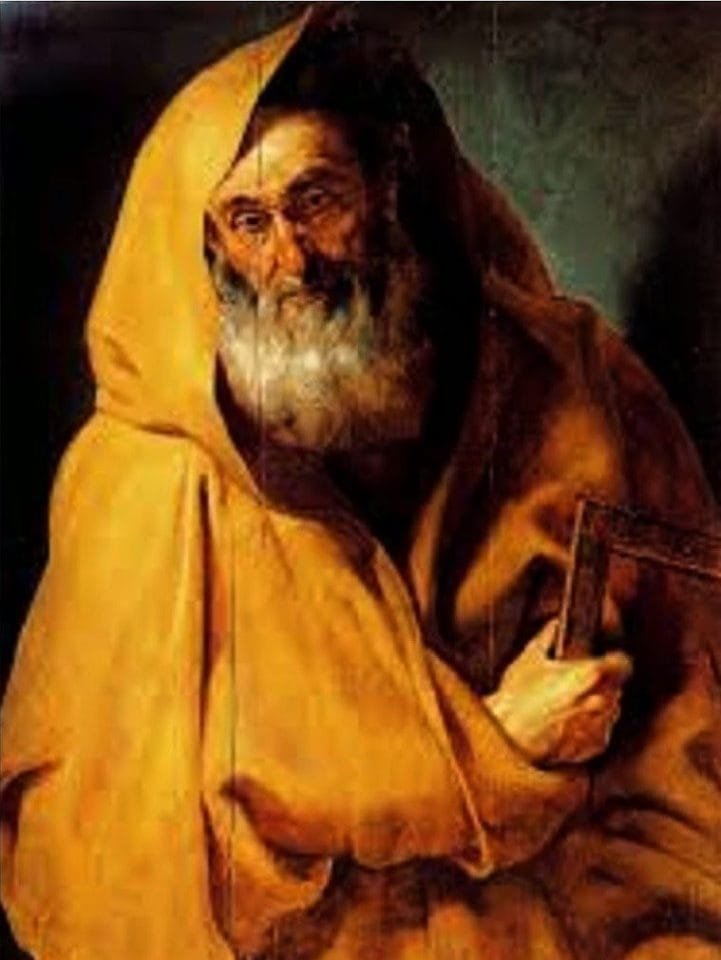
Among experts, the question of the identity of these two figures with the same name, James son of Alphaeus and James “the brother of the Lord”, is disputed. With reference to the period of Jesus’ earthly life, the Gospel traditions have not kept for us any account of either one of them. The Acts of the Apostles, on the other hand, reveal that a “James” played a very important role in the early Church, as we have already mentioned, after the Resurrection of Jesus (cf. Acts 12:17; 15:13-21; 21:18). His most important act was his intervention in the matter of the difficult relations between the Christians of Jewish origin and those of pagan origin: in this matter, together with Peter, he contributed to overcoming, or rather, to integrating the original Jewish dimension of Christianity with the need not to impose upon converted pagans the obligation to submit to all the norms of the Law of Moses. The Book of Acts has preserved for us the solution of compromise proposed precisely by James and accepted by all the Apostles present, according to which pagans who believed in Jesus Christ were to be asked only to abstain from the idolatrous practice of eating the meat of animals offered in sacrifice to the gods and from “impropriety”, a term which probably alluded to irregular matrimonial unions. In practice, it was a question of adhering to only a few prohibitions of Mosaic Law held to be very important.
Thus, two important and complementary results were obtained, both of which are still valid today: on the one hand, the inseparable relationship that binds Christianity to the Jewish religion, as to a perennially alive and effective matrix, was recognized; and on the other, Christians of pagan origin were permitted to keep their own sociological identity which they would have lost had they been forced to observe the so-called “ceremonial precepts” of Moses. Henceforth, these precepts were no longer to be considered binding for converted pagans. In essence, this gave rise to a practice of reciprocal esteem and respect which, despite subsequent regrettable misunderstandings, aimed by its nature to safeguard what was characteristic of each one of the two parties.
The oldest information on the death of this James is given to us by the Jewish historian Flavius Josephus. In his Jewish Antiquities (20, 201ff.), written in Rome toward the end of the first century, he says that the death of James was decided with an illegal initiative by the High Priest Ananus, a son of the Ananias attested to in the Gospels; in the year 62, he profited from the gap between the deposition of one Roman Procurator (Festus) and the arrival of his successor (Albinus) to hand him over for stoning.
As well as the apocryphal Proto-Gospel of James, which exalts the holiness and virginity of Mary, Mother of Jesus, the Letter that bears his name is particularly associated with the name of this James. In the canon of the New Testament, it occupies the first place among the so-called “Catholic Letters”, that is, those that were not addressed to any single particular Church—such as Rome, Ephesus, etc.—but to many Churches. It is quite an important writing which heavily insists on the need not to reduce our faith to a purely verbal or abstract declaration, but to express it in practice in good works. Among other things, he invites us to be constant in trials, joyfully accepted, and to pray with trust to obtain from God the gift of wisdom, thanks to which we succeed in understanding that the true values of life are not to be found in transient riches but rather in the ability to share our possessions with the poor and the needy (cf. Jas 1:27).
Thus, Saint James’ Letter shows us a very concrete and practical Christianity. Faith must be fulfilled in life, above all, in love of neighbor and especially in dedication to the poor. It is against this background that the famous sentence must be read: “As the body apart from the spirit is dead, so faith apart from works is dead” (Jas 2:26). At times, this declaration by Saint James has been considered as opposed to the affirmations of Paul, who claims that we are justified by God not by virtue of our actions but through our faith (cf. Gal 2:16; Rom 3:28). However, if the two apparently contradictory sentences with their different perspectives are correctly interpreted, they actually complete each other. Saint Paul is opposed to the pride of man who thinks he does not need the love of God that precedes us; he is opposed to the pride of self-justification without grace, simply given and undeserved. Saint James, instead, talks about works as the normal fruit of faith: “Every sound tree bears good fruit, but the bad tree bears evil fruit”, the Lord says (Mt 7:17). And Saint James repeats it and says it to us.
Lastly, the Letter of James urges us to abandon ourselves in the hands of God in all that we do: “If the Lord wills” (Jas 4:15). Thus, he teaches us not to presume to plan our lives autonomously and with self interest, but to make room for the inscrutable will of God, who knows what is truly good for us. In this way, Saint James remains an ever up-to-date teacher of life for each one of us.
SOURCE: http://www.vatican.va/content/benedict-xvi/en/audiences/2006/documents/hf_ben-xvi_aud_20060628.html
EMPHASIS MINE.
Stay updated: subscribe by email for free TO OUR NEW WEBSITE www.catholicsstrivingforholiness.org (PUT YOUR EMAIL IN THE SUBSCRIBE WIDGET).
We are also in www.fb.com/Catholicsstrivingforholiness. Kindly help more people in their Christian life by liking our page and inviting your family, friends and relatives to do so as well. Thanks in advance and God bless you and your loved ones! Fr. Rolly Arjonillo
